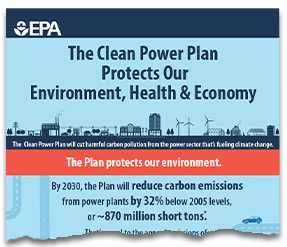Clean Air Act Section 111d
It’s Time to Repeal the Clean Power Plan
The CPP no longer serves any useful purpose, and keeping it on the books invites mischief by the Supreme Court.
The Clean Power Plan (CPP) was the Obama Administration’s signature climate effort. This 2015 regulation aimed to move state power grids away from coal and toward renewable energy. It immediately became ensnared in litigation and never went into effect. It’s now considered irrelevant for all practical purposes. Yet the Supreme Court is now set to …
Continue reading “It’s Time to Repeal the Clean Power Plan”
CONTINUE READINGACE or Joker? Trump’s Self-Defeating Climate Rule
The ACE rule adds costs, achieves little, and disempowers the states. Nice job.
The Trump ACE rule violates all the Administration’s own deregulatory principles.To hear Trump talk, the point of deregulation is to reduce the burden of regulation on industry. But weirdly enough, that doesn’t turn out to be true of Trump’s effort to repeal Obama’s Clean Power Plan (CPP) and replace it with his own Affordable Clean …
Continue reading “ACE or Joker? Trump’s Self-Defeating Climate Rule”
CONTINUE READINGForeseeable Yet Lamentable: Pruitt’s Attack on Carbon Restrictions
As expected, the Trump Administration is trying to repeal Obama’s regulation.
Few things were more foreseeable than a repeal of the Clean Power Plan (CPP) by the Trump Administration. The Clean Power Plan had three strikes against it: (1) it addressed climate change; (2) it disfavored coal and promoted the use of renewable energy in electricity generation; and (3) it came from the Obama Administration. The …
Continue reading “Foreseeable Yet Lamentable: Pruitt’s Attack on Carbon Restrictions”
CONTINUE READINGBreaking News: D.C. Circuit Dismisses Challenge to Clean Power Plan on Procedural Grounds
But More Challenges Will Follow
The D.C. Circuit Court of Appeals has dismissed the first challenge to EPA’s proposed Clean Air Act Section 111d rule to reduce greenhouse gas emissions from power plants (known as the Clean Power Plan) on the grounds that the rule is only a proposed rule, not a final one. The court’s opinion can be found …
CONTINUE READING






